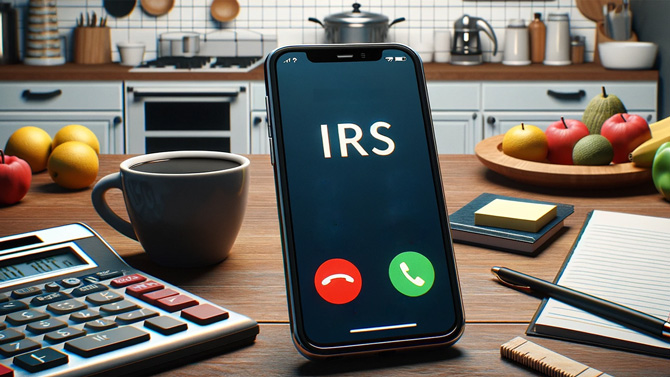This tax season, the scams might be more sophisticated than ever. With the latest AI tools, scammers can create deepfakes, using hyper-realistic conversational audio that makes it seem like you're speaking with a real IRS official. This is especially concerning because, according to recent research from internet security company McAfee, over half of Americans lack confidence that they will be able to spot these deepfake calls when they get them.

The unique threat during tax season is that stress and urgent deadlines can cloud judgment. In addition to Americans' lack of confidence in spotting scams, only 48% of Americans feel confident about filing their taxes. This combination makes for a perfect hunting ground for scammers.
In my interview with Steve Grobman, Executive Vice President and Chief Technology Officer at McAfee, he sounds the alarm: "AI tools have made it possible to produce scams that are more realistic and convincing than ever before, making it even more difficult for consumers to separate fact from fiction."
Read more: Investment Scams Surge: New FBI Report Warns of Record Losses
Due to advancements in AI, deepfakes are becoming harder to spot. Grobman explains, "Human instincts, judgment, and years of experience, while helpful, are not always enough to identify whether content is authentic or artificially generated."
So, if you're unsure whether the person you're speaking with is, in fact, an IRS agent, the best course of action is to hang up and call back using a phone number the IRS has posted on its website. However, there are often signs of a deepfake if you know what to look for.
Technical clues to spotting deepfakes
These technical signs can suggest the audio may be a deepfake. However, keep in mind that deepfake technology is continually improving, so these may not be present. Also, some scammers may use a combination of real and AI-generated audio. So don't assume that because part of a call sounds legitimate, the rest of it is.
Unnatural voice quality
Listen for subtle glitches or distortions, such as robotic tones, uneven pitch changes, or a lack of natural pauses and breathing.
Odd inflections and phrasing
Deepfakes might have unusual stresses on words or strange pronunciation that doesn't quite match a real human speaker.
Inconsistencies in background noise
Pay attention to background sounds. Do they fit the supposed environment? Are there abrupt changes or noises that seem out of place?
Read more: How to Tell if Your Number Was Spoofed & What You Can Do About It
Contextual clues to spotting deepfakes
Consider the bigger picture of what you're hearing, and if the situation raises your suspicions, be suspicious.
Urgency and emotional pressure
Scammers often use fear, urgency, or excitement to make you act without thinking. Be extra cautious if what you hear tries to elicit strong emotions.
Unusual requests
Are you being asked to do something that would be considered out of the ordinary for the IRS (or any legitimate institution)? Demands for immediate payment and personal information or threats to contact law enforcement or garnish your wages are red flags.
Out of the blue contact
Is the call completely unexpected and out of character for the institution (your bank, etc.)? Question any unsolicited communication.
Read more: Behind the Screens: Are Your Text Messages Safe from Hackers?
The takeaway
Above all else, remain vigilant. Critically evaluating the information you're given and thinking twice before acting can make the difference between foiling a sophisticated scam and falling victim to it.
[Image credit: IRS call concept generated by OpenAI's DALL·E]
For the past 20+ years, Techlicious founder Suzanne Kantra has been exploring and writing about the world’s most exciting and important science and technology issues. Prior to Techlicious, Suzanne was the Technology Editor for Martha Stewart Living Omnimedia and the Senior Technology Editor for Popular Science. Suzanne has been featured on CNN, CBS, and NBC.
















From J K Flanery on March 28, 2024 :: 2:17 pm
Note - The IRS will not call you unless they are already working on a case with you.
They always send snail mail first!
Reply